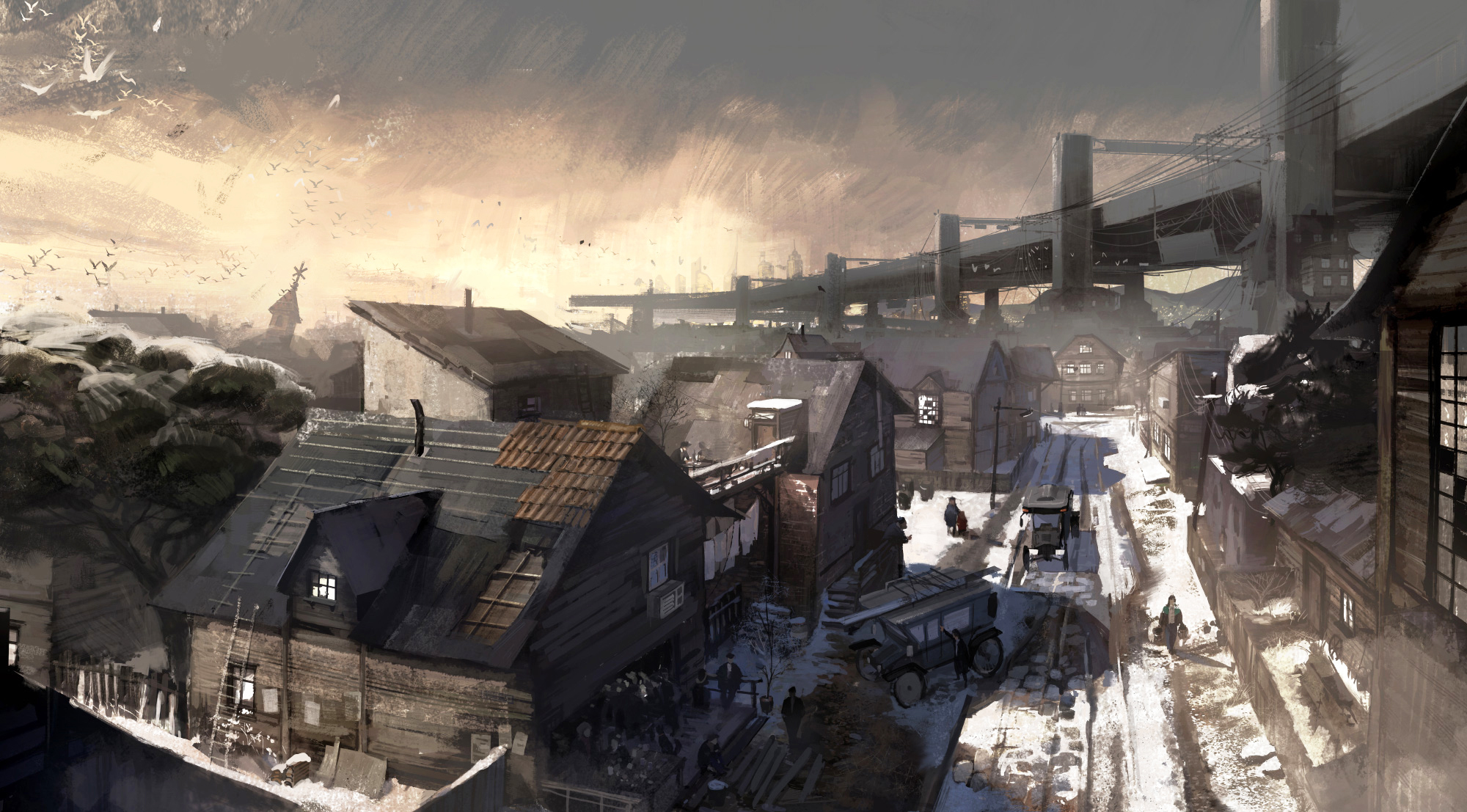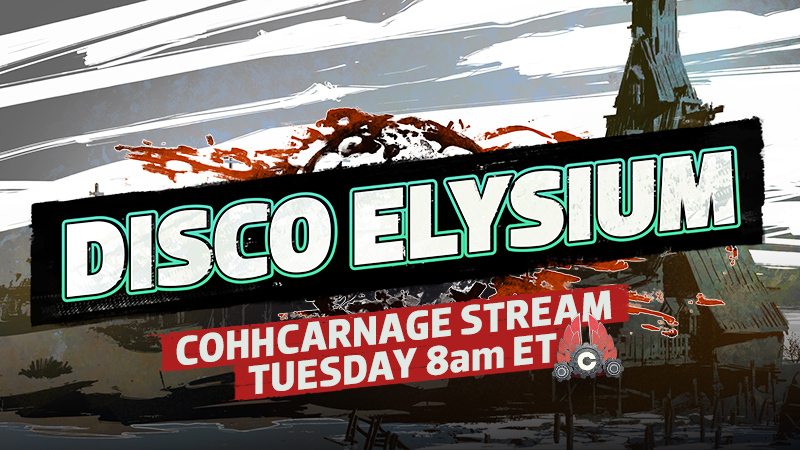
You are not well. You've woken up on the floor of a grimy hotel room with a hangover so devastating you might as well be dead. You don't remember who you are, which city you're in, or what happened the night before. Apparently you're a detective, in town to solve a murder, but you don't feel like a cop. You feel like shit.
Disco Elysium is a detective RPG of improbable depth. It's part Planescape: Torment, part police procedural, part psychodrama. Your fatally hungover detective peels himself off the carpet, naked except for a pair of soiled underpants, and begins the laborious process of piecing his broken mind back together, while simultaneously attempting to solve a gruesome murder on the wrong side of the tracks.
The game has stats, skill checks, companions, quests, and an interface inspired by classic Infinity Engine CRPGs and tabletop roleplaying games. But it also has a lot in common with visual novels and point-and-click adventures, with dense, branching dialogue and the ability to intimidate, charm, or bullshit your way out of tricky situations via several novels' worth of brilliantly strange, vibrant dialogue. There's no clicky Baldur's Gate-style combat here: everything happens via skill checks, dialogue, and text, including when things turn violent.
A man has been found hanging from a tree in an empty lot and it's your job to find out who killed him—if you can get near the corpse without puking. Disco Elysium's sallow, flare-wearing protagonist is a total disaster. The taste you get in your mouth the morning after a heavy night of drinking made flesh. The sticky floor of a discotheque given life. But the beauty of the game is how you can remould this grotesque lump of sin into something else entirely.
Thanks to that skull-shattering hangover, and the amnesia conveniently brought on by it, your detective is truly a blank slate. You can reveal things about yourself by talking to the poor souls caught in the wake of your apocalyptic bender. But you're also given the opportunity to suppress these discoveries, even down to denying your own name and choosing a new one. The degree of freedom you have to shape your character's psyche is really quite astonishing.
A cavalier attitude can lead to interesting, unexpected things
Through conversations you control every facet of your personality. You're given a variety of ways to respond to people, and this dictates your personality, how the population reacts to you, and the outcomes of quests. The things you say and decisions you make in Disco Elysium really, actually matter, affecting your role in the world and the inner workings of your mind in a meaningful way.
You also have to watch what you say, because doing the usual RPG thing of exhausting every conversation option regularly leads to you putting your foot in your mouth and getting someone (or yourself) in trouble. Characters will remember things, so it pays to think carefully before making any rash decisions or betraying someone. Then again, a cavalier attitude can lead to interesting, unexpected things: an example of how well Disco Elysium caters to different play styles.
Skills are important too. There are 24 in total, ranging from logic, perception, and reaction speed to endurance, conceptualisation, and authority. A character with high authority might find it easier to pressure a timid witness into spilling their guts. A high logic character can divine truth from a clear-headed analysis of a crime scene. There are some more esoteric skills too such as inland empire, which lets you pluck inspiration from dreams and talk to inanimate objects.
Conversely, a character with low perception can miss case-breaking clues floating right in front of their face, while a low endurance cop will struggle in even the most trivial physical trials. All the defining traits of the best fictional cops are in there, but importantly, the worst are too. So if you want to have the superhuman insight of Sherlock, but also be a self-destructive mess like The Wire's Jimmy McNulty, Disco Elysium lets you.
The more thoughts you develop, the more complex your character becomes
When you create a character, your starting skills are determined by the stats you roll. Your base stats are intellect, psyche, physique, and motorics, which make you better or worse at certain things. But as you play you earn experience points that let you upgrade any skills you like, allowing you to sculpt your character further. You might start out physically weak, but stick enough points into the appropriate skills and you can become a force of nature.
And I haven't even mentioned thoughts yet. As you speak to people you'll reveal thoughts that can then be slotted into your brain and developed over time, unlocking stat buffs and fascinating, insightful nuggets of story. Some of these have a major effect on your character's mental state, while others are more frivolous and largely played for laughs. You're limited to three thoughts to begin with, but skill points can also be used to unlock more. And the more thoughts you develop, the more complex your character becomes.
The result of all this is one of the most preposterously malleable characters in RPG history. You can create a highly empathetic communist disco music enthusiast, a self-deprecating artist who punches first and asks questions later, a deluded rock-and-roll cop with a passion for democracy, or a drug-addicted feminist psychic. Every person who plays Disco Elysium will have a different experience as a result of the frankly audacious depth of its role playing.
The game is set in the fictional city of Revachol; specifically a dreary, forgotten district called Martinaise. Plagued by poverty, crime, corrupt unions, and scarred by a violent revolution, it's exactly the kind of place you'd expect to wake up after a three-day drug binge. It's gorgeous, with a stylish, painterly aesthetic, expressive characters, and detailed backgrounds. But it's filthy too, which is relayed mainly by that gloriously rich, evocative writing. A vividly described autopsy made me feel genuinely queasy.
The writing is funny, subversive, and, admittedly, a little self-indulgent at times
Many of the people you meet say disgusting, offensive things, which is entirely justified by the grotty bleakness of the setting. Martinaise is a horrible place filled with horrible bastards. But there are flickers of warmth and humanity, too. People making the most of a bad hand, struggling against an uncaring world. It's a lavishly realised setting with acres of history and culture to discover, although occasionally, in some optional conversations, I felt like a mountain of rather dull, long-winded lore had been suddenly dumped on my head.
Typically the writing is funny, subversive, and, admittedly, a little self-indulgent at times. But it's also incredibly good, with an anarchic literary flair that makes even the most matter-of-fact conversation hugely entertaining. There's partial voice acting too, although it varies wildly in quality. The sleazy, rasping delivery of your ancient reptilian brain, which regularly emerges to taunt you, sounds wonderfully evil. And I love the soft, calming voice of Lt. Kitsuragi, your partner, who is a kind of moral centre for the wild and unpredictable protagonist.
Freedom in Disco Elysium isn't just limited to shaping your character. The structure is also extremely open-ended, letting you pursue the murder as doggedly, or not, as you like. A list of tasks is constantly building up in your notebook, and you can perform them in any order you like: including those linked to the main case. And they're all interconnected, meaning doing one task before another can open up completely new avenues of investigation.
Martinaise is a large, open space made up of several distinct areas and the sheer volume of stuff to interact with, people to talk to, and quests to pick up is quite overwhelming. You'll investigate a dilapidated apartment block, a frozen coastline, a crumbling boardwalk, a dockyard, and other suitably grim locations, all of which are brought to life by that beautiful art—not to mention atmospheric music, lighting, and ambient sound design. It's a place you can really get lost in.
How you complete tasks and solve crimes is dependent on your character. If you're the physical, all-action type, you'll deal with situations in a more direct, aggressive way. But if your character is psychological or empathetic, you might find a more subtle solution. Crucially, every kind of player is catered for. In my experience you'll never hit a brick wall because of the way you've built your character. This makes Disco Elysium a supremely satisfying RPG, because if you want to play a certain way, it's primed to accommodate it.
The thing about Disco Elysium is that my experience of it is completely unique to me, such is the dizzying variety of skills, stats, thoughts, and conversation options on offer. You could play through it five times and still not see everything, so there's no one experience to assess. But I can say with certainty that it's one of the finest RPGs on PC if you value depth, freedom, customisation, and storytelling.










